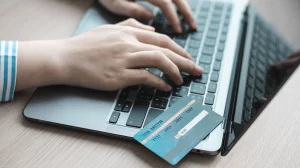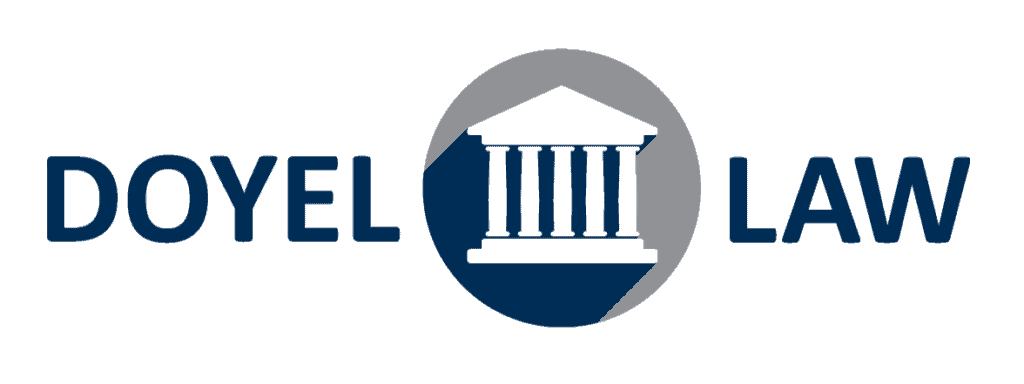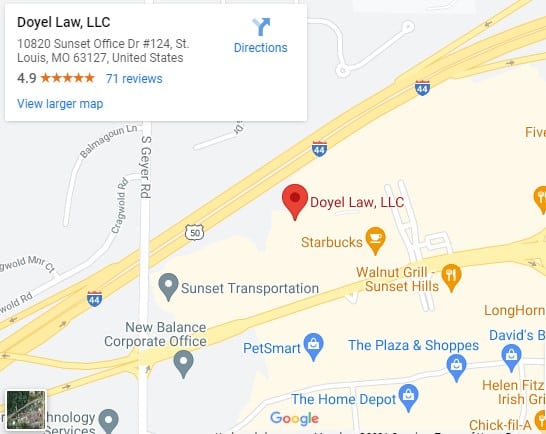Credit Card Debt Attorney in Sunset Hills, Missouri
When using a credit card, decisions are made swiftly and guilt-freely because you know you’ll just pay it off later. Too many United States citizens put off things until later and later, which is made worse by unanticipated expenses and problems. You find yourself confronted by a startling credit card debt and a mounting sense of worry all of a sudden.
Doyel Law can assist you in navigating your credit card debt and achieving financial security. To analyze your case and determine the actual state of your problem, contact our Missouri credit card debt attorney and escape the cycle of debt.
Why do I need a Missouri Credit Card Debt Attorney for a Bankruptcy case?
The majority of your unsecured debt, including credit card debt, can typically be discharged in a Chapter 7 bankruptcy. In the event that you are not qualified for Chapter 7, we might be able to help you file for Chapter 13 bankruptcy, which will enable you to pay back a portion of the debt in a more manageable way.
After being granted a bankruptcy, there will be some restrictions on how you can use credit cards. A knowledgeable Missouri credit card debt lawyer will inform you of these and assist you in comprehending how filing for bankruptcy may impact your future efforts at credit repair.
You don’t have to carry around a colossal amount of credit card debt. The sooner you start looking for a solution by speaking with an experienced credit card debt attorney, the better. Don’t fight this alone, paying but never making progress. Give Doyel Law the opportunity to assist you more effectively and provide the legal services you need while protecting necessary assets. Contact us now!
What is Bankruptcy?
Through the legal process of bankruptcy, individuals or other entities that are unable to pay their creditors back can seek partial or complete relief from their debts. Bankruptcy is typically imposed by a court order that is frequently requested by the debtor.
A petition is filed, either on behalf of the debtor, which is more often, or on behalf of creditors, which is less frequent, to start the bankruptcy process. All of the debtor’s assets have been measured and assessed, and some or all of the debt may be repaid with the help of the assets.
An opportunity to start over is provided through bankruptcy, which discharges debts that are just unaffordable while providing creditors a chance to get some compensation based on the assets that can be liquidated by the individual or organization.
What is Credit Card Debt?
A sort of unsecured liability that results from revolving credit card borrowing is credit card debt. By opening many credit card accounts with various terms and credit limitations, borrowers can amass credit card debt. Credit bureaus will report and monitor all of a borrower’s credit card accounts. Since credit card accounts are revolving and perpetually open, they often represent the majority of outstanding debt on a borrower’s credit report.
The accumulated outstanding balances that many borrowers carry over from monthly are typically referred to as credit card debt. For debtors looking to make purchases with postponed payments over time, credit card debt can be helpful. The interest rates on this kind of debt are some of the highest in the industry. However, cardholders do have the choice to pay down their balances each month in order to reduce their overall interest costs.
How is Credit Card Debt affected by Bankruptcy?
Credit card debt is discharged in both Chapter 7 and Chapter 13 bankruptcy cases. Credit cards fall within the category of unsecured obligations that are forgiven in bankruptcy. A credit card debt is a typical sort of debt that can overwhelm people and send them into a loop of making minimal payments.
Applying for credit is made simple by credit card companies. If you pay the minimal amount due, they will continue to issue credit, which frequently results in a cycle of credit card debt that the person is unable to pay off.
If there is an unforeseen illness or job loss, they won’t have the extra cash needed to make their monthly credit card payments. Even if they are barely making ends meet by making the required monthly payments, the majority of these payments will go toward interest and won’t help them get out of debt.
When to stop making credit card payments and declare Bankruptcy?
Bankruptcy may be a suitable choice if you are unable to pay your debts.
It is not a choice to be made lightly to file for bankruptcy. However, paying some debts—such as credit card debt—becomes a waste of money once you’ve decided to go on. The following factors will determine whether to stop making payments:
- whether you have the means to repay the bill
- if you’ve established your bankruptcy eligibility
- if you’re certain that filing for bankruptcy is what you want to do
- if a bankruptcy attorney has authorized you to do so
Not paying your credit card payments could place you in a worse financial situation, unless you’ve done all mentioned above.
Continue credit card payments if Bankruptcy is not necessary
The first thing to think about when thinking about filing for bankruptcy is if you can manage to pay off your credit cards. Why? Because you most likely won’t be eligible for Chapter 7 bankruptcy if you earn enough money to do so. The court mandates that filers with a significant amount disposable income to pay all or part of their credit card debt through a Chapter 13 repayment plan.
Additionally, if you file for bankruptcy, it will show up on your credit report for seven to 10 years. Therefore, it’s wise to go over all of your options first.
Keep paying your credit cards until you are certain that you want to file
How can you tell if declaring bankruptcy is a smart move? Here are a few hints.
Have you been harassed or sued?
You will normally start getting a lot of calls from the credit card company or its representatives as soon as you stop making payments on your credit cards. The calls will become more frequent and intrusive the more delinquent you are. Most people think about filing for bankruptcy relief as a result of the persistent harassment they receive from debt collectors.
The credit card company or a debt collection agency may decide to file a lawsuit to recover its debt, depending on your assets and the amount you owe. The credit card company will be entitled to seize your assets or conduct a wage garnishment if it obtains a monetary judgment against you in order to collect the debt. Consider filing for bankruptcy if you are being sued or the credit card company refuses to negotiate with you.
How much property do you own?
A debtor can use bankruptcy exemptions to protect or “exempt” property in both Chapter 7 and Chapter 13 bankruptcy. Exemptions from bankruptcy differ from state to state. Depending on the bankruptcy chapter you file, what happens to “non-exempt” property that is not secured will vary. As a result, you should evaluate the exemption regulations of your state and think about Chapter 7.
This is how it works. The bankruptcy trustee in a Chapter 7 bankruptcy will sell your nonexempt property and use the proceeds to repay your creditors. It might not be in your best financial interest to file for Chapter 7 bankruptcy if you have a lot of property that you cannot exempt from protection in bankruptcy.
In contrast, you can keep all your possessions if you file for Chapter 13 bankruptcy. However, the value of your nonexempt assets will be the amount you must pay to your unsecured creditors, such as credit card companies. You do not have to pay it in full, which is great news. Depending on how long your repayment plan is, you’ll pay it off over three to five years.
Continue making credit card payments before declaring bankruptcy
In most circumstances, paying credit card bills is equivalent to flushing cash away if you’re eligible to file for bankruptcy. Stopping your credit card payments, though, can do extra harm if you’re still unsure or think you won’t file your case for a while.
Additionally, you should confirm that you are eligible for bankruptcy before you cease making payments on your credit card debt. Once you stop, costs mount up quickly, and it could be challenging to bring your accounts current if you don’t file. In order to be eligible for Chapter 7, you must pass the Chapter 7 means test, so you should make sure that you do.
If not, you may need to apply for Chapter 13, and being eligible for Chapter 13 is not a guarantee either. For many filers, the cost of funding a Chapter 13 repayment plan may be overwhelming.
Can Bankruptcy stop a Credit Card Debt?
If you’re facing legal action over an unpaid credit card debt, applying for bankruptcy relief can halt the legal action and discharge the debt.
Using the Automatic Stay to prevent a Creditor’s Lawsuit
The automatic stay, which is a court order, is put into place the moment you file for bankruptcy. Most creditors are prohibited from starting or continuing collection actions against you while the automatic stay is in effect, including through collection lawsuits. Without the bankruptcy court’s approval, a credit card provider that has previously sued you for debt collection cannot continue throughout the duration of the stay. A credit card firm typically lacks the legal justification to succeed in the move, despite creditors being free to seek the court to lift the stay.
Credit Card Debt elimination through Bankruptcy
Your responsibility for the unsettled credit card debt will be eliminated if you are successful in getting a bankruptcy discharge. Therefore, upon your bankruptcy discharge, the state court will normally dismiss the case. But bear in mind that the lawsuit will resume where it left off when the court dismisses your case with no discharge. Additionally, if the credit card company has won a lawsuit against you and put a lien on your property, that lien will not be instantly removed by your discharge.
A discharge can be challenged by creditors.
The credit card company may occasionally have a reason to contest the debt discharge. The most frequent defenses raised by creditors focus on fraud. In an adversarial action (trial), a creditor would most likely object to either presumptive fraud or general fraud.
Certain transactions are presumed to be fraudulent by the bankruptcy court. For instance, accepting a cash advance 70 days prior to filing for bankruptcy or spending money on luxury items 90 days prior to doing so strengthens the presumption. You’ll need to demonstrate that the transaction was legitimate.
A general fraud claim could likewise be made by a creditor. A debtor can effectively refute a fraud claim in bankruptcy by demonstrating that the costs were for necessary things. Purchases for daily expenses like utilities, food, or required clothing are considered necessary things.
Call our Missouri Credit Card Debt Attorney Now!
Make an appointment with our reputable Credit Card Debt Attorney in Sunset Hills, Missouri right immediately if you are stuck in a cycle of credit card debts affecting your monthly budget. To determine if declaring bankruptcy is the best option to stop making credit card payments and the stress that comes with them, our law office will look at your current income and credit card debt.
Congress established bankruptcy as a safety net to end the pattern of low or late payments and provide you with a fresh start. To discuss your options, get in touch with our Bankruptcy lawyer at Doyel Law.



